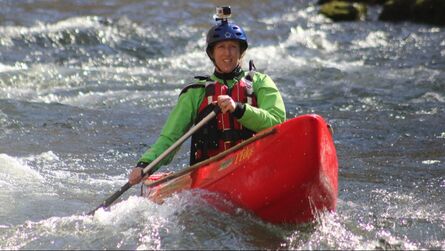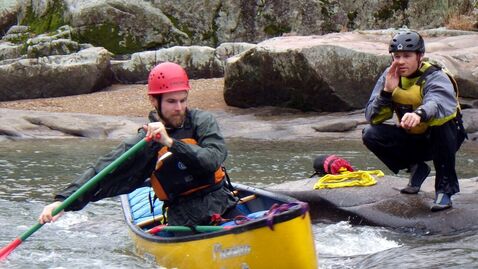By Leah Fuller I held my breath as I watched the current ahead surge from wide, lazy flat water into a turbulent whitewater chute. The narrowed passage caused the water to rush rapidly straight toward a large, intimidating boulder where the roiling water boiled up, over, and around the mass. It was obvious that while water might be able to find its way around the rock, something more solid might not fare so well. I pictured myself and my little canoe being pushed up and over the boulder, flipping, and smashing into more rocks below, and the thought terrified me. A voice snapped me out of my nightmarish daydream, bringing me back into reality, “Where would you need an instructor to be in this rapid with a group of novice paddlers?” I pried my eyes away from the intimidating boulder and scanned the rest of the rapid. I was in a certification class for whitewater instructors, and all of us pointed at the big eddy on river right just above that horrible looking hazard. Our instructor, Dave, grinned and like every good facilitator continued to question, “Why would you choose that eddy and not somewhere else? Look at this other eddy on river left. Why wouldn’t you want to go there?” We thought about his question for a moment and threw out a few answers. Some wavered as they considered the value of being in a different eddy. Dave listened patiently; then went on to say, “You want to sit in the eddy that you want your novice paddler to get to because you want them to look at you, which is where they need to go, not at what they want to avoid.” Such a simple concept, this wisdom has been a tremendous help to me as a whitewater canoeing instructor and in my daily life. Quite naturally, I first focus my eyes on the nasty boulder that I desperately want to avoid. And yet, when I acknowledge the hazard and then choose to fix my eyes on where I need to go, I am far more likely to actually avoid the ominous hazard that is threatening to suck me in. I recently was reading in 1 Peter 1:6-7 and identified a similar principle. “In this you greatly rejoice, though now for a little while you may have had to suffer grief in all kinds of trials. These have come so that your faith – of greater worth than gold, which perishes even though refined by fire – may be proved genuine and may result in praise, glory and honor when Jesus Christ is revealed.” These words uplift and encourage, but when you really look at what Peter is saying, it’s not really that pleasant. When we think about life’s seasons of growth, they typically include some form of suffering, trial, or hardship. And, when in the midst of the hard stuff, most of us struggle to see anything other than the big, intimidating hole that we want to avoid or that we’re already swimming in as it threatens to drown us. It is so difficult to take our eyes off our suffering to see the end result of our faith being proved genuine and bearing the fruit of God’s glory  Hazards vary in a river. There are boulders, undercut rocks, hydraulics, and strainers—all having the potential to toss one about or just cause one to eat his lunch. Similarly, hardship can take many forms in our lives, such as conflict in an important relationship, the compounding needs of family and friends, struggling with grief over the death or health of someone we deeply love, or just feeling worn out by the lack of time to get everything done. The list could go on. In the New Living Translation of 1 Peter 1:13, just after reminding us that suffering has a good purpose, Peter says, “So think clearly and exercise self-control. Look forward to the gracious salvation that will come to you when Jesus Christ is revealed in the world.” Thinking clearly in the midst of hardship and looking forward to what’s ahead is so hard to do. At times, we flounder and think it would be easier to surrender to the push of the water. I just want to fix my eyes on the hardship and let it have its way with me, even knowing the result will be a terrifying swim. Life gets hard, and everything seems overwhelming and tends to cloud my ability to think clearly or to trust God. I can become bitter, resentful, and full of fear, not sure if I will be able to endure much more, let alone survive the next rapid. And yet, we can journey and grow to trust God’s goodness. We can allow the truth of what and how He thinks about us to take root in the deep places of our soul. With our thinking redirected, we find it easier to focus on where we need to go, looking forward with our eyes fixed on God, rather than obsessing over the things we want to avoid. To be sure, we can steadfastly look at Jesus and still face hardship or end up swimming. We will still need to run the rapid, but when I see God—my instructor—sitting in a calm eddy in the middle of the rapid ready for me to join Him there, I can think more clearly. I can maneuver my boat into the fast moving current, look at Him, and fully trust that I will make it to Him, that He will coach me through, and that when or if I do flip, He will throw the rope to rescue me. Even as an experienced whitewater instructor, I have to exert great effort to practice this principle of looking where I need to go and not at what I want to avoid. When I approach a new rapid or hardship, I take a deep breath, fix my eyes on what I know is true, and commandeer the paddle strokes I have been practicing for years to maneuver into that eddy. You may be approaching and trying to avoid hardship or already swimming in a rapid. Are your eyes fixed on the struggle or fixed on God’s strength? Take a few minutes to sit still and ask yourself, “Where is Jesus sitting in the midst of this trial? What is He thinking of me? What truth can I reflect on and breath in to help me think clearly and fix my eyes on Jesus?” Here are two truths that have been helpful for me: “Find rest, O my soul, in God alone; my hope comes from him. He alone is my rock and my salvation; he is my fortress, I will not be shaken” (Psalm 62:5-6) “Be still, and know that I am God” (Psalm 46:10)
1 Comment
|
Come along side us as we journey in and out of the wilderness, discovering our Creator in creation.
Archives
July 2024
Categories |
Contact Us
|
|

 RSS Feed
RSS Feed

